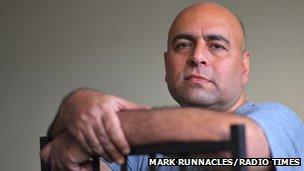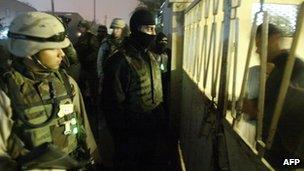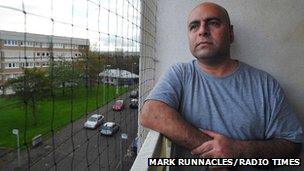Iraq to Glasgow - interpreters' battle with life in UK
- Published

Several hundred Iraqis who risked their lives helping the British during the Iraq war were offered the chance to live in the UK, but many have struggled to settle.
When the email arrived in Hashmat's account (not his real name) - he knew what it was before he opened it. The attachment was in Arabic.
"It said I was an infidel and that I would be killed."
He tries to laugh it off, but I notice he shivers as he tells me. It was a fatwa and from that day on, Hashmat was a marked man.
Hundreds of Iraqis found themselves in the same position. Identified as working for British forces, their lives became too risky.
After some opposition, the British government set up the Locally Engaged Staff Assistance Scheme (LESAS) to resettle them here. Not all of them made it. Some were killed. Others did not meet the strict criteria.
Eventually, about 364 interpreters and their dependants came to the UK and many ended up in Glasgow.
So what did they find here and what are they doing now?
I asked Hashmat, who worked with the British in an administration role, what his first day was like.
"It was terrible. They took us to this damp place - there were cockroaches," he tells me. "I couldn't believe they had put us there."
All the interpreters I spoke to in Glasgow told me exactly the same story. They were all put in the same infamous block, at different times.
They all battled with dampness and peeling paint and insects, until the council moved them to better accommodation.
Risking lives
What struck me about these four men was their positivity.

Interpreters played a crucial role in helping coalition forces in Iraq
Always smiling, they continually count their blessings because they cheated death and brought their families to a safe, new life. But they are still surprised and disappointed with their initial treatment.
Hashmat tells me that they were dealt with "like asylum seekers".
He says that they had risked their lives for the British every day and deserved more than that. But as with most of the interpreters, a joke is never far off to lighten the mood.
"I would have got better treatment if I had been from the eurozone, not the Green Zone," he grins.
I was born in Glasgow and want to know what the interpreters knew about the city before they got here and what people were like to them.
"I didn't know anything," says Hashmat, "My friend in Baghdad told me to get a shirt - Celtic or Rangers."
Another Iraqi, Mohammed, tells me: "When I told my family I was going to Glasgow, they told me that wasn't even in Britain."
Abdul, who worked as an interpreter in Basra, shrugs: "I didn't know anything about Glasgow, but I knew about William Wallace from the film Braveheart."
So what were people like to them?
Immigration is a divisive issue, even in Scotland, where population pressures are fewer. Three of the men enthuse about the friendliness of Glaswegians.
Abdul tells me he had a "racist problem with some people" but that it is better now because he was moved.
I observe the men greeting neighbours and cracking jokes in their Glaswegian-Iraqi accents. They seem at home. The bigger problem for all four men is work - or lack of work.
"I fixed the teeth of British soldiers in Baghdad. I was a qualified dentist.
"Here I cannot touch anyone," Hashmat tells me.

Without qualifications from the UK, Ali is finding it difficult to find professional work
He is trying to get the appropriate qualifications here but it is a long road.
His frustration is mirrored by Ali, another former interpreter who I meet in his council flat.
He acted as an interpreter for Tony Blair, Jack Straw and Gordon Brown. Now he is unemployed, living on benefits, and feeling invisible.
"It hurts me. I deserve better. But I came here for my children. For their future."
He gestures to his two young daughters, happy in their world of nursery rhymes and after-school snacks.
"I won't work as a taxi driver. Why should I?" he asks me. "I'm a graduate of Sandhurst. I am an educated man."
A spokesperson for UK Border Agency says: "Families are provided with clean and secure accommodation. We regularly carry out checks to make sure that those who have settled in the UK get the best care possible.
"On arrival people are given extra support, with rent paid for the first three months and assistance provided in registering with a doctor, seeking a job and further education. This helps to ease people and their families into their new lives in the UK."
The four men I spoke to are all different - one has a degree in engineering, one is a qualified dentist, and as Ali pointed out he is a graduate of Sandhurst.
But they have one thing in common - they are all unemployed.
They do not want to criticise the government who employed them, then rescued and resettled them. But they want some help so that they can contribute to society, reclaim their self-worth.
They know that jobs are scarce in the current economic climate. They do not expect to be fast-tracked into the perfect job.
I think they just want the government to remember they are here - and why.
BBC Radio 4's The Iraqi Interpreter's New Home will be broadcast on Friday, 28 October 2011 at 11:00 BST. Or listen online afterwards at the above link.